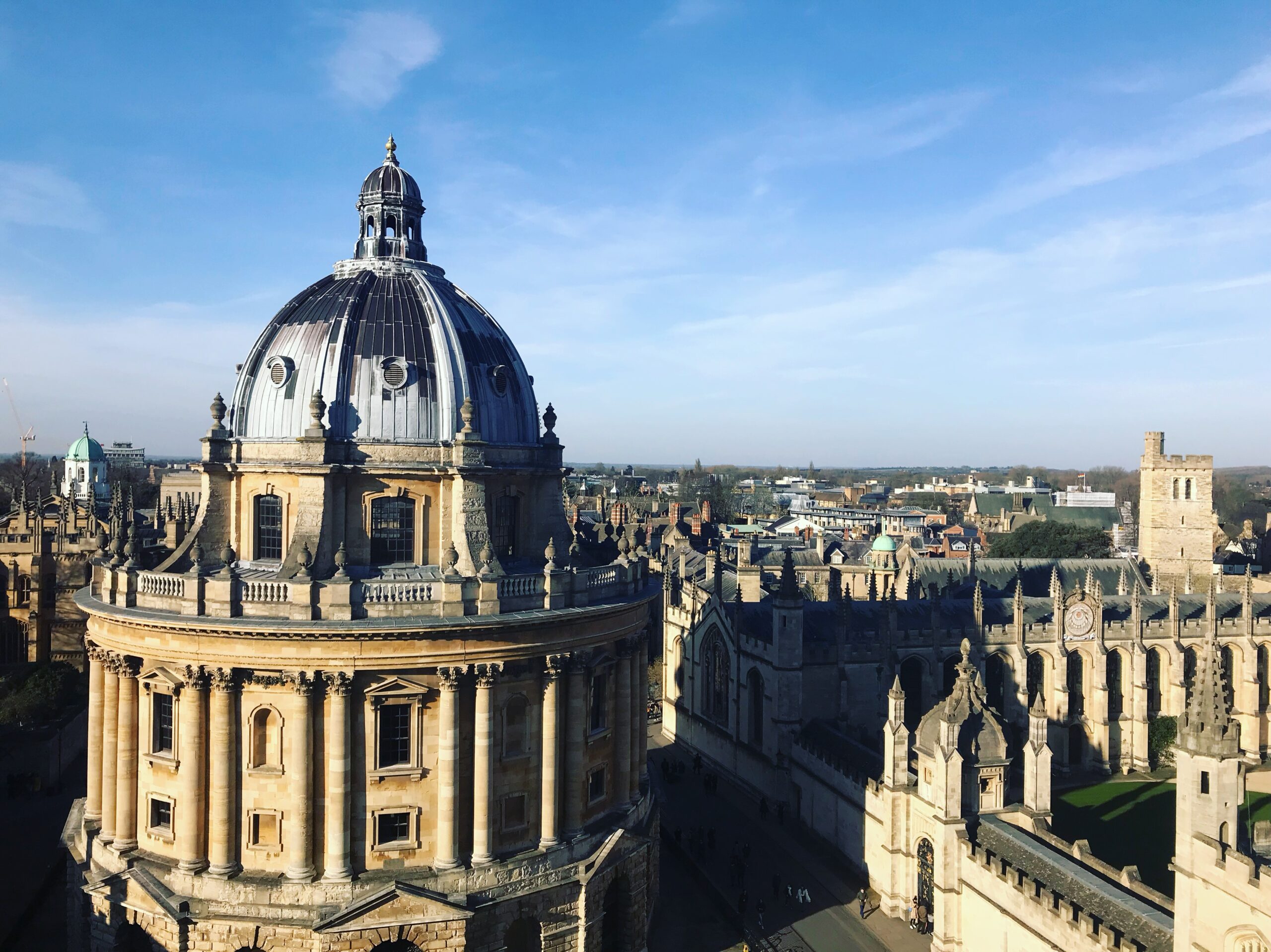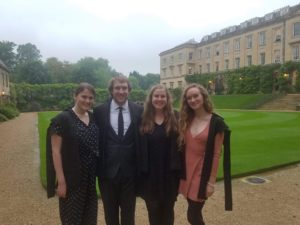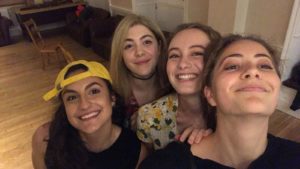As Cliché As It Sounds, I “Found Myself” Abroad


Preconceived Notions are Hard to Overcome
American students studying abroad have almost become a parody of themselves. From painstakingly staged Instagram posts of picnics under the Eiffel Tower to bar-hopping in Barcelona, the portrait of the college junior taking a semester to “study” whilst draining their parents’ wallets romping around Europe is not entirely flattering.
Determined to escape this stereotype, I elected to choose a program in which no one would doubt the credibility of my choice to study abroad. This is how I ended up enrolling at the University of Oxford, Worcester College, through IFSA.
My motivations for deciding to apply to Oxford were entirely academic—or so I thought. Vassar College (my home institution) is quite expensive, so I figured that if I were to study abroad anywhere in the world, I better receive equal if not superior education in philosophy and mathematics as I do at Vassar. Happily, I was incredibly satisfied with the quality of instruction I received while at Oxford. In just 16 weeks I wrote 24 essays, was forced to defend my ideas orally in front of leading scholars in my field, and was granted access to lectures across any subject at the University. So, my expectations for academic rigor abroad were matched. But is that it? Was all I got out of my nearly 6 months across the pond an enriched understanding of Kantian ethics and Frege’s conception of “number”?
Glad you’re asking these questions, because they were none I would have considered asking of myself prior to departing in January of 2018. Of course I’d heard students come back from abroad eagerly boasting about how they “found themselves” or, even more cringe-worthy, dreamily recalling the many ways in which abroad “changed them” —major eye roll material, am I right? In my mind, there were two reasons for going abroad: to have access to course opportunities that would not be otherwise available at one’s home institution, or to return fluent in a non-native language.
Granted, I did concede that, perhaps were I to study in a country with drastically different customs than the United States, my beliefs, world outlook, etc. might be impacted. But I was about to depart to England, after all! How much “finding myself” could I really do in a country so similar to my own? As I was about to find out, quite a lot.
Change Is Not a Bad Thing
Heading into my second term at Oxford after an exhausting 5-week vacation, I was feeling quite at home and eager to start my new tutorials. I should mention that I was also looking forward to resuming weekly ice-cream get-togethers with Andrew, our IFSA Resident Director, and other IFSA-Oxford visiting students.
The best part about these gatherings was that at each one I seemed to meet new IFSA students from across the University; in particular, one week I met my friend Lauren, who was studying at Teddy Hall. Lauren has since become one of my closest friends whom I would have never met had it not been for IFSA, but I’ll save my adoration for her for another time. As we ate our ice-cream/pizza bagels (a George and Davis Ice-Cream favorite!), Lauren casually mentioned that she had become very active in Oxford’s LBGTQ+ Society. I became instantly intrigued.
Admittedly, I’d longed to venture out to one of the society’s weekly “Tuesgay” socials since arriving at Oxford. But not only did I not feel entirely comfortable with the queer part of myself yet, I also trembled at the idea of venturing into to an openly queer space alone, where, I presumed, everyone already knew each other.

Again, I reminded myself that one of my goals for studying abroad was to attempt to push myself out of my comfort zone and seize unique opportunities that might cross my path. So, I mustered up the courage to message Lauren late that day (a Tuesday, by the way!) to see if I could ever tag along with her to LGBTQ+ events. Lauren’s response was beyond enthusiastic, and we agreed to meet up at Jesus College, where the social was being held.
I was ridiculously nervous. Possibly even more so than before my first tutorial, or while being read my grades in front of the Worcester Provost (a world- renowned Shakespeare scholar, for context). Nevertheless, I managed to hold my composure as I curiously followed Lauren’s confident stride through the college’s historic courtyard into the common room.
After about two hours at the social, I’d completely lost any feelings of anxiety that I had had. Lauren made such an effort to integrate me with the friends she had made in the society, and quite shockingly to me, they seemed just as enthused about getting to know me as I was them. From attendees to Society representatives, that social, and the 6 others I went to after that, were where I found myself among the most friendly and open students I’d met during my entire time at Oxford.
I felt unbelievably welcome and strangely comfortable with my identity in a way that I had never experienced. The last 6 weeks of my time abroad were without a doubt the best, and the happiness I experienced during this time was almost wholly due to my integration into the LGBTQ+ community at Oxford.
Reflections, Difficulties, and Moving Forward
I’ve known that I’m a lesbian since, as strange as it may sound to others who haven’t had this experience, elementary school. When all my friends began to label themselves as “boy crazy”, I found myself lacking any ability to relate to the conversation. But for reasons ranging from concern over family upset to personal feelings of confusion over my identity, I suppressed any and all romantic feelings I ever had towards women throughout the majority of my time in college prior to abroad, and tried to mold myself into the agreeable heterosexual person I thought I was meant to be. All I can say now is, I’m extremely grateful I no longer have to force myself to be someone I’m not.
Here’s the thing: I could have come out any time I wanted to at Vassar. We are, after all, one of the most openly queer campuses in the United States. Yet I think this is precisely the reason why I never felt ready to come out at Vassar. Everyone always seemed SO confident in their queerness, and I was still unsure about what multitude of labels under the queer umbrella I even fit in. If I could talk to my first-year self again, I’d give two pieces of advice, which hopefully at least one reader might find useful.
First, there’s no “right time” to come out—take as much time as you need to explore your identity, because sexuality can be a complicated, frustrating component of yourself to pin down. For me, abroad really was the ideal environment to ask myself these questions. No one had any pre-conceived notions of who I might be attracted to or have dated in the past. In turn, this helped me to free myself from any constraints on who I expected myself to be.
Second, there is no one correct way to look, act, or talk like a queer individual. For years, I felt insecure with what I now know is my duality of femininity and identity as a lesbian. The media so often tastelessly stereotypes LBGTQ+ individuals, and, as someone who loves wearing floral-print dresses and prefers to wear my hair on the long side, I just never felt like I fit society’s mold for who I knew I was.
However, the range of incredible women I met at Oxford’s LBGTQ+ Society flipped my perspective on this topic. I finally realized that the only thing I have to do to be a lesbian is, simply, prefer to date other women, and any aspect of my personality or looks beyond that is insignificant.

So, somewhat stubbornly, I admit that abroad did indeed “change me.” But why shouldn’t it? No matter where you decide to study abroad, the mere fact that you are putting yourself in a different environment after living so long in a familiar place will mean that you discover, whether big or small, new things about yourself, your beliefs, and your goals.
I arrived at Oxford expecting to receive nothing more than a world-class education, but I’m pleased to report that I took away something even more valuable: self-acceptance. And this leads to my last piece of advise: studying abroad is intensely unpredictable, so try to go in with as few expectations as possible. Try as you might, you will be changed by your abroad experience in ways you may have never thought of. Enjoy it, appreciate it, and accept it.
Josephine L. | Mathematics and Philosophy Major | Vassar College | University of Oxford Partnership | Spring 2018